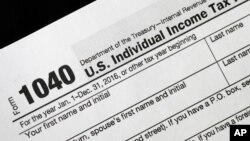As President Donald Trump promotes a tax plan that critics say would raise the federal deficit by slashing corporate rates and eliminating some taxes paid by the rich, three-quarters of Americans think the wealthiest should pay more, Reuters/Ipsos polling shows.
Trump was expected to travel Wednesday to Harrisburg, Pennsylvania, to explain to a group of workers, including many truckers, how he thinks they will benefit from his tax plan, which was released two weeks ago.
The president was expected to describe how, if his plan becomes law, truckers would benefit from lower tax rates for the middle class, lower taxes paid by the manufacturers whose products they transport, the creation of a new tax category and rate for "pass-through" companies, and the elimination of a tax paid by the wealthiest 0.2 percent of estates, a senior administration official said.
Trump has said his tax plan would be a "miracle for the middle class" and spur economic growth by creating a better tax climate for businesses. He was expected to tell the truckers that his plan "would likely give the typical American household a $4,000 pay raise," according to an excerpt from his prepared remarks.
White House economic adviser Kevin Hassett has said that if U.S. companies brought foreign-earned profits home, the median household would see real income rise by $4,000 over the next eight years.
Democrats have disputed the assumptions.
"I have not seen any evidence that even comes remotely close to that," Representative Richard Neal of Massachusetts, the top Democrat on the House Ways and Means Committee, said of the calculation at a forum on Wednesday in Washington.
Neal's Republican colleagues on the tax-writing committee will meet Thursday to flesh out key components of Trump's tax framework, lawmakers and aides said.
"That's where a lot of details are going to be finalized," said Representative Kristi Noem of South Dakota, a Republican member of the panel.
Aiming for January
Congressional tax writers in the House and Senate are working to fill in the details of White House plan so Republican leaders can aim to pass it by January, delivering what would be Trump's first legislative victory a year into his presidency.
Independent analysts have said Trump's blueprint would provide uneven tax relief, add to the federal budget deficit, and in some cases benefit the very wealthy.
Taxpayers in the highest 1 percent of incomes, making more than $730,000 annually, for example, would receive about half of the total benefit from Trump's proposed overhaul, with their after-tax income expected to increase an average of 8.5 percent, according to the Tax Policy Center, a Washington-based nonprofit.
A Reuters/Ipsos poll conducted from September 29 to October 5 found that 53 percent of adults "strongly agree" that the wealthiest Americans should pay higher tax rates.
An additional 23 percent "somewhat agree" the wealthiest should pay higher tax rates, according to the poll of 1,504 people, which had a credibility interval, a measure of accuracy, of plus or minus 6 percentage points.
Trump's tax framework proposed cutting the corporate tax rate to 20 percent from 35 percent and creating a new category for pass-through income earned by partners and sole proprietors, which would be taxed at 25 percent instead of the 39.6 percent top individual rate currently paid by some.
It also proposed cutting the top individual rate to 35 percent, but congressional tax writers may opt to create an additional, higher rate for the highest earners.
Trump's plan also suggested eliminating the 40 percent tax paid on estate assets worth more than $5.5 million, or $11 million for a married couple.






